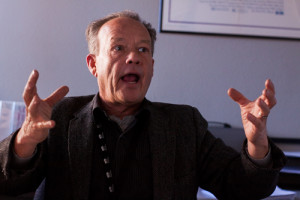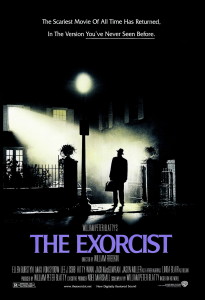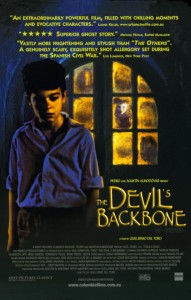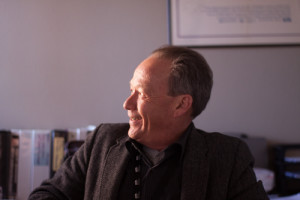Tags
Related Posts
Share This
Lockhart on Horror

“The more the scarier,” mentioned by Liam as he passionately describes his horror film class. Photo by Jason Stilgebouer.
Liam Lockhart, interim associate chairman of The Film School, is teaching his International Horror Cinema class for the third time this spring semester. While the film lineup from previous semesters may change, Lockhart has promised that some of his more “obscure” favorites will be in store: The Devil’s Backbone, Lunacy and Wreck among others. Jackalope Magazine interviewed Lockhart to discuss both the class and his love of horror cinema.
Jackalope Magazine: Can you start off by telling us a bit about your attraction to the horror genre? Why teach such a class?
Liam Lockhart: I was going to say, you know a lot of people ask me ‘why horror as a topic?’ And I can tell you, for years when I was working in Hollywood, you know cutting stories for people or mixing films for them, invariably you’d get into conversations and they’d say ‘so what’s your favorite genre of films?’ And I would always kind of turn my head, put my hand in front of my mouth, cough and say ‘horror.’ They’d say, ‘what?’ And I would go, ‘horror.’ They’d go, ‘no, I can’t believe you like horror films, you seem much too sophisticated, much too intelligent.’ They obviously didn’t know me. [Laughs]… but for years, I was always in a position where I had to defend my love of horror films. And so when I finally found myself in the position to teach I thought, ‘well, OK, now here’s a chance.’ I thought if nothing else, I can prove to myself that I’m not alone in my love for horror films… This is only the third time now that I’ve offered this class and it’s been full to capacity. This way I know I’m not alone, I know there are other people out there that embrace the genre along with myself.
 JM: On that note, I took this class a few semesters back. I remember you saying that fans of the horror fans are one of the most sophisticated film audiences.
JM: On that note, I took this class a few semesters back. I remember you saying that fans of the horror fans are one of the most sophisticated film audiences.
LL: Yes! And, you know I don’t think I’m alone in making that statement. I think a lot of lovers of the horror genre are people who appreciate cinema and will recognize that, as lovers of horror films, we have to be keyed into a lot of clues, be they audio or visual clues. Light motifs that let us know. Ah, the repeated piece of music that means that the killer is approaching. Shots that linger on doors or halls. We know that invariably they’re going to come back in at a later time or place. I also think that horror audiences are the most forgiving of all audiences. We can invariably let some loopholes go by in the plot, maybe some technical slip ups, as long as there is, I don’t know, that one good idea. That one essential thing. That insight that we may not have been clued into otherwise… In fact, a lot of the films that I love I’d say, yeah, they’re great films. Not necessarily technically. Maybe not considered so by other people, but they resonate within me, they manage to hit that one note, whatever it may be.
JM: One thing I find really interesting about this class is that it is international horror. With American horror films, so many of the same stories are recycled constantly, usually bible stories. Do you hope that by taking this class, students will be exposed to other types of stories?
LL: Yes, absolutely, and I love your choice of words there, Franco, when you said a Bible story because, as I think we all know, the Puritan influence that founded this country is still in existence to this day. I mean, most of our movies basically are repetition of the old maxim, you know, ‘don’t have premarital sex or horrible things will happen to you.’ How many of these movies do we need to see? You know, how many can we see? The formula becomes so predictable, and in a way, characters like ‘Jason’ or ‘Michael Meyers’ or people like that, they are a God-like figure. They are omnipotent, you know. They are all powerful, they can never be destroyed, they are seemingly all knowing. They are going out with their agenda that they are advancing at all costs. It’s almost like the God of the Old Testament. A very vengeful and wrathful God seeking revenge on those teens who are having premarital sex. I can think of a lot more issues that I’d sooner be concerned with than that, you know? I think that’s the beauty of international horror films. A lot of these films contain social commentary. In some cases, coming out of countries where there was oppression at the time and the message couldn’t be delivered in a straightforward fashion but needed to be delivered within the genre.
 JM: What would you say to those who may be hesitant to take the class out of a dislike for the genre? Is it important to be exposed to things you don’t like?
JM: What would you say to those who may be hesitant to take the class out of a dislike for the genre? Is it important to be exposed to things you don’t like?
LL: If somebody were to offer a course on musicals, I would have the same reaction as people who don’t want to see horror. I would be like, ‘no! Don’t do this to me!’ It’s funny and I have had students who have actually signed up for the course and they come in and say, ‘you know I really don’t like horror films, it’s my least favorite genre,’ and I admire them… because they’re stepping out of their comfort zone and they’re exposing themselves to something that they know they don’t like, but maybe feel that they should know something about.
A common concern that people have when they come to me about the class is the amount of violence that they might see in the films, the level of gore, and I always try to reassure people that I’m not into the gore aspects at all. I’m not into the sadistic aspects of horror, although invariably you’ll find little elements of both popping up in films, but I have no time for movies like Saw or The Martyrs or torture porn. So I reassure them, I say that the horror in my films are all of the psychological nature, and the beauty of that is that it is something that will stay in your mind and fester well into your old age. So, hopefully you’ll be left with some indelible, undying memories. I always say that, you know, we all have a dark side and in order to appreciate the light, you have to look in to that dark side. Hopefully you’re not living out those experiences but just recognizing that it is an aspect of ourselves. And it’s funny, because a lot of people, you know, they think, ‘oh, I like horror films, that makes me really edgy,’ and oh, you know. Horror is reactionary by nature. I mean, it’s flying in the face of every scientific, intellectual achievement that civilization has ever made. Horror is returning to the cave. It’s returning to the dark. It’s being scared of your own shadow. So, I always think it’s really interesting that there’s this kind of contradiction, if you will. Those people who think, ‘oh, I’m into horror so that makes me more advanced’ when in essence, it’s a reflection that you’re kind of stepping back to a different time or a different sense of appreciation. Why was The Exorcist so successful when it was released, you know? For me, it’s because the nation at that time, in the 1970s was still embroiled in Vietnam, we’ve got a president that is going to be the first to ever resign because of Watergate, there is no clear-cut definition of right and wrong anymore. Anti-heroes have started to appear as our main protagonists! So here comes the exorcist where it’s ‘good or bad.’ It’s ‘God or the Devil,’ you know. It’s simple, and I think that’s why people really latched onto that film at that particular time.
JM: The first time I saw that film was in your class, and it terrified me. It does exactly what you said, it flies in the face of every intellectual and scientific stance. It asks, ‘what if there are ghosts?’
LL: What is that classic line I always misquote from Hamlet? ‘There’s more in Heaven and Earth that can possibly be dreamed of in our philosophies.’ You know, that kind of approach. I myself am half Irish, and my grandmother on my Irish side had the gift of second sight. I grew up I was listening to all of her ghost stories, so as far as I’m concerned, that’s an indisputable truth. I mean, I’ve always believed in ghosts. I’ve had my own personal experiences with ghosts and that’s something that for me is true!
JM: Interesting. Do you feel that ghost stories are a part of your relationship to the genre?
LL: I mean, yeah! You know, I tell you, if nothing else, what is a ghost story? It’s affirmation of an afterlife. It’s letting us know that it doesn’t end when the physical ends. And so, personally, I think ghost stories are the most comforting movies that are out there, because it may not take care of your immediate needs, but they let you know, ‘hey, it’s not over when you think it’s over.’ Whether that’s true or not remains to be seen, but I promise you I’ll come back and haunt this campus to put that to the test. [Laughs].
JM: For a final thought, what do you most hope students get out of your class in the approaching semester?
LL: You know that’s a very good question. I hope they maybe get, um…well, you know the same with any art form. I would like the viewer, the audience member to be able to personalize it. To take that piece of art and be able to examine their own life up against it. I mean, I think that’s the purpose of art regardless of the genre or medium, whether it be a film or painted work of art, or a sculpture: It is meant to serve as a form of communication between the creator and us the viewers.
This interview has been edited for space and clarity.







 Jackalope Magazine is the student magazine of Santa Fe University of Art and Design. Building on the interdisciplinary nature of our education, we aim to showcase the talent of our university and character of our city.
Jackalope Magazine is the student magazine of Santa Fe University of Art and Design. Building on the interdisciplinary nature of our education, we aim to showcase the talent of our university and character of our city.
Recent Comments